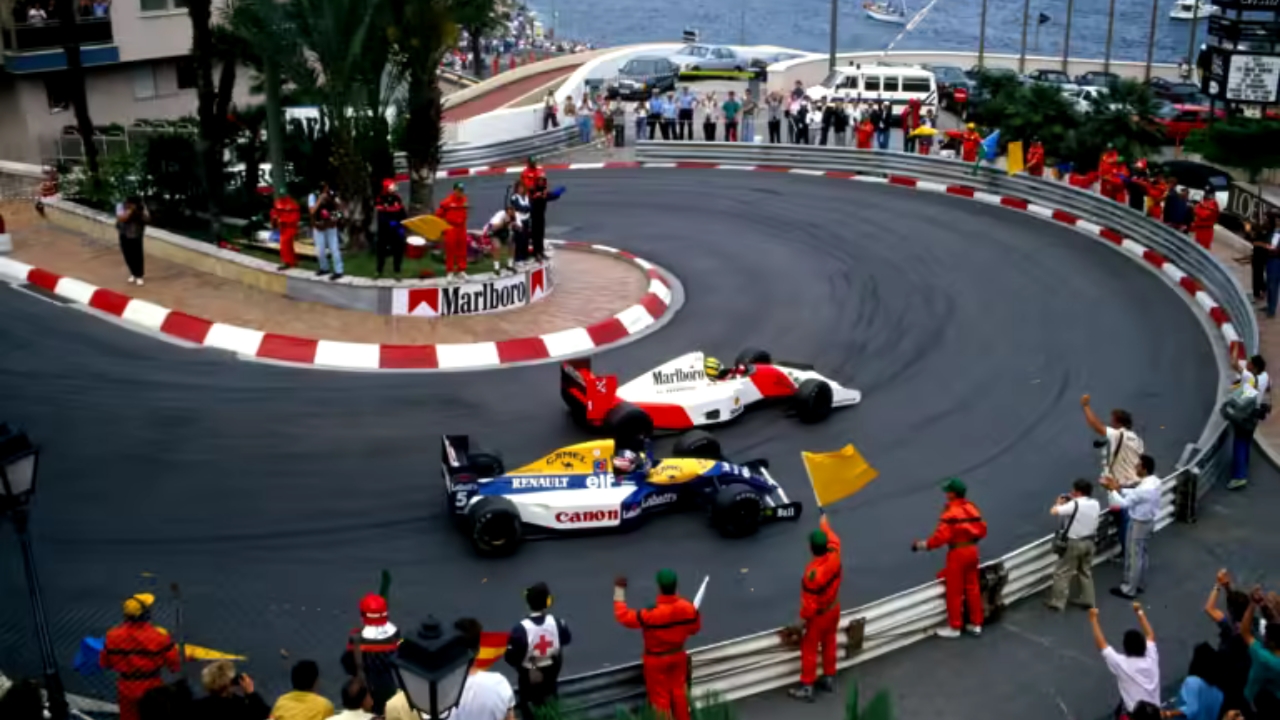The One That Got Away
Nigel Mansell, the former Formula One world champion, often reflects on the Monaco Grand Prix as the elusive jewel in his illustrious racing career. Despite winning both the F1 and IndyCar championships, the victory on the streets of Monte Carlo remained frustratingly out of reach. In a conversation with Giles Richards, Mansell recounted the 1992 Monaco Grand Prix, a race where he nearly triumphed but was ultimately thwarted by Ayrton Senna’s impeccable defensive driving.
In 1992, Mansell was driving the Adrian Newey-designed FW14B Williams and had already dominated the season with five consecutive wins. His hopes were high for Monaco, especially after qualifying a full second faster than his teammate Riccardo Patrese. Ayrton Senna, driving a McLaren, qualified third. Despite his slower qualifying time, Senna’s mastery of Monaco’s narrow, winding streets was well known and feared.
A Battle for the Ages
The race initially seemed firmly in Mansell’s control as he built a commanding 30-second lead by lap 71. However, a suspected loose wheel nut or puncture forced him into a late pit stop, allowing Senna to take the lead. With fresh tires, Mansell launched a ferocious chase, reducing the gap to mere seconds. With three laps remaining, he was right on Senna’s tail, setting the stage for one of the most thrilling finishes in F1 history.
Mansell described the final laps as among the most intense battles of his career. He attempted every conceivable maneuver to overtake, but Senna blocked each move with surgical precision. “With the rules as they were, Ayrton could block like a double-decker bus,” Mansell recalled. “Today, he would have got 10 stop-go penalties.” Despite his frustration, Mansell respected how they raced so closely without any collisions, a testament to their exceptional driving skills.
The race ended with Senna crossing the finish line just 0.2 seconds ahead of Mansell. Post-race images showed an exhausted Mansell, barely able to stand, being helped to the podium. He later explained that his exhaustion was genuine, exacerbated by racing with three broken toes and the intense pressure of the race.
Legacy and Reflection
Reflecting on his career and that race, Mansell acknowledges that while Monaco remained out of reach, the experience was invaluable. He praised Senna’s exceptional skill and remembered their rivalry as intense but respectful. “Ayrton was an icon of the sport,” Mansell said. “What he was able to do inside and outside the car was incredible. I am proud to have known and raced so hard with him.”
Senna’s untimely death at Imola in 1994 still resonates deeply with Mansell. “There is still a part of me that thinks he is around,” he reflected. “Everybody thought Ayrton was bulletproof. Even 30 years on, it still feels like a bit of a shock.”
Mansell’s achievements, including 31 Grand Prix wins and his 1992 championship, cement his place in F1 history. Yet, the 1992 Monaco Grand Prix remains a defining moment of his career, illustrating his relentless pursuit of victory and the fierce competition he faced. This race, more than any other, showcased Mansell’s determination and skill, even in the face of heartbreaking setbacks.
Life Beyond Racing
Beyond his racing legacy, Mansell continues to impact lives as the president of the charity UK Youth. This role allows him to make a difference off the track, engaging with disadvantaged young people and helping them connect and feel valued. Mansell uses magic tricks as an icebreaker, capturing the attention and imagination of the youth he works with. “Doing a little bit of magic for them gets them engaged,” he shared. “You have to engage young people because they all have stories.”
Mansell’s dedication to youth work highlights his commitment to excellence and service beyond the realm of motorsport. His ability to connect with young people and inspire them is a testament to his character and the values he holds dear. He believes in the potential of every young person and works tirelessly to help them realize their worth and capabilities.
Reflections on Rivalries and Friendships
Mansell’s reflections on his career often return to his rivalries, particularly with Senna. Their battles on the track were fierce, but they were underpinned by mutual respect. “Racing against Ayrton was always a challenge, but it pushed me to be better,” Mansell said. “He set the bar incredibly high, and that made all of us strive to reach it.”
The 1992 Monaco Grand Prix is emblematic of their rivalry. It was a race where both drivers displayed their utmost skill, pushing each other to the limit without crossing into recklessness. This race is often cited as one of the greatest in F1 history, not just for the thrilling finish, but for the demonstration of pure racing talent and sportsmanship.
A Lasting Impact
Mansell’s career is a testament to perseverance, skill, and the relentless pursuit of excellence. While the 1992 Monaco Grand Prix was a bitter disappointment, it also highlighted the qualities that made Mansell a champion. His ability to reflect on these experiences with a sense of pride and respect for his competitors speaks volumes about his character.
In addition to his sporting achievements, Mansell’s ongoing commitment to youth work ensures that his legacy extends beyond the racetrack. He continues to inspire new generations, not just as a champion driver but as a mentor and role model.
Nigel Mansell’s story is one of triumphs and challenges, marked by unforgettable moments like the 1992 Monaco Grand Prix. Through it all, he has remained dedicated to the principles of hard work, respect, and giving back, making him not just a champion on the track, but in life.
For more updates and detailed coverage, follow us at nbcnewz.com.
